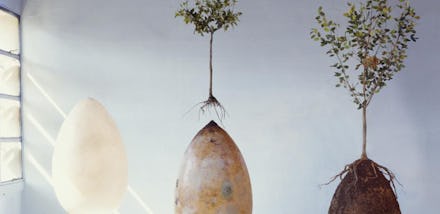Don't Be a Boring Old Corpse When You Die — Become a Tree

The cemetery can be a grim place. Hulking tombstones and mausoleums serve as a constant reminder of the passage of time and our own mortality. But one Italian initiative is out to change all that, and what its creators have in mind might grow on you.
The idea behind the Capsula Mundi project, Latin roughly for "world pod," is simple. After you die, your entire body is buried inside a large biodegradable pod that serves as nutrients for a tree to grow above.
Participants would be able to choose their favorite from a variety of trees. Designers Anna Citelli and Raoul Bretzel envision cemeteries of the future becoming a "sacred forest."
"I'm glad it resonates," Joe Sehee, founder of the Green Burial Council, told Mic. "There have been lots of iterations of this idea over the years." According to its website, the council aims to "encourage environmentally sustainable death care and the use of burial as a new means of protecting natural areas."
Sehee, however, cautioned that the idea poses many problems on a practical level, including tree maintenance and going around regulations such as the "concrete burial vault" requirements.
An overlooked problem: Still, the Capsula Mundi project offers a lot to feel good about since, believe it or not, traditional burials are quite environmentally taxing. In Grave Matters: A Journey Through the Modern Funeral Industry to a Natural Way of Burial, author Mark Harris lays out the true toll they take on the environment.
According to Harris, your average 10-acre area of cemetery holds 1,000 tons of casket steel, 20,000 tons of vault concrete and a swimming pool-sized amount of toxic chemicals. For the honor of contributing to all that, you'll pay a median price of more than $8,000.
Other options: Cremation is another option, but it still adds needless fossil fuel emissions into the environment and also has also been cited for potentially hazardous mercury releases caused by dental fillings.
While it may still be a few years before you can opt to be reincarnated as a tree — the latest idea is still just a concept — there are an increasing number of "green burial" opportunities in North America.
According to the Green Burial Council, the number of locations offering a green burial have increased from one in 2006 to 340 today. The process often entails a burial with as minimal an environmental impact as possible, making use of biodegradable material and forgoing toxic chemicals like formaldehyde.
When you throw in prices that won't send you to an early grave, it's no wonder that the green burial movement has never been more alive.